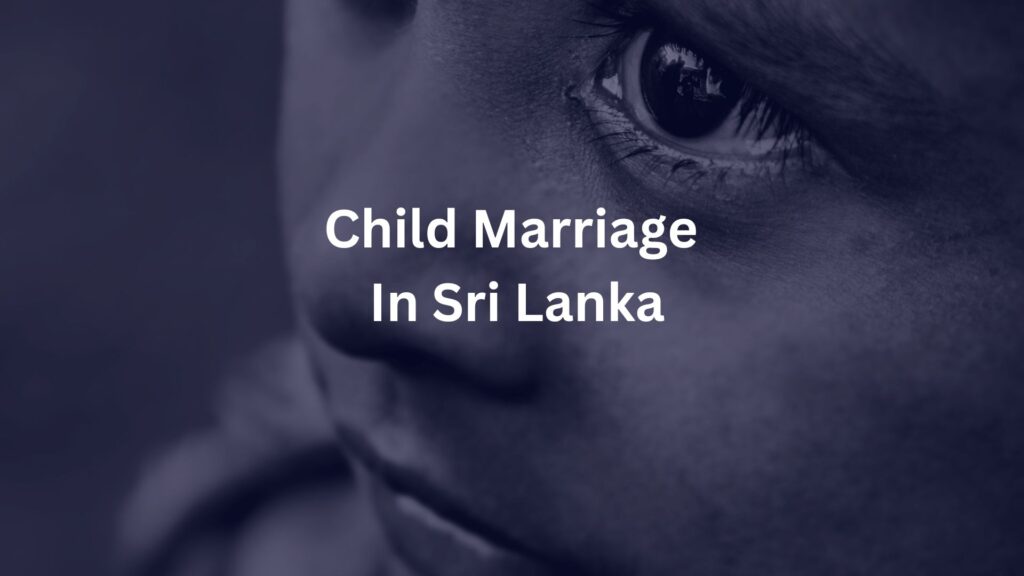
Introduction
Child marriage in Sri Lanka remains a pressing human rights issue, where personal laws and constitutional rights often clash. Despite legal reforms and international pressure, the practice persists, particularly in Muslim communities governed by personal laws that allow underage marriages. This article explores the conflict between personal laws and constitutional rights in Sri Lanka, the legal landscape surrounding child marriage, and the ongoing fight to end this harmful practice.
Understanding Child Marriage in Sri Lanka
Child marriage, defined as a union where at least one party is under 18, disproportionately affects girls, depriving them of education, health, and economic opportunities. In Sri Lanka, child marriage is fueled by:
- Cultural and religious traditions
- Poverty and lack of education
- Gender inequality
- Legal loopholes in personal laws
While the general law (under the Marriage Registration Ordinance) sets 18 as the minimum age for marriage, Muslim Marriage and Divorce Act permits girls as young as 12 to marry with parental consent. This contradiction has sparked legal battles and human rights campaigns to align Sri Lanka’s laws with international standards.
What is the minimum age of marriage in Sri Lanka?
The Legal Framework: Personal Laws vs. Constitutional Rights
1. General Law & Muslim Personal Law – Minimum age of marriage
- General Law (Marriage Registration Ordinance):
- Minimum marriage age: 18 for both sexes.
- Requires consent from both parties.
- Applies to all Sri Lankans except Muslims.
- Muslim Personal Law (Muslim Marriage and Divorce Act – MMDA):
- No minimum age for marriage; girls can marry at puberty (often interpreted as 12).
- Allows parental consent to override a minor’s rights.
- Permits polygamy and unilateral divorce (talaq) for men.
This legal dualism creates a human rights crisis, where Muslim girls are denied protections granted to others under the constitution.
2. Constitutional Rights Violations
Sri Lanka’s Constitution guarantees fundamental rights, including:
- Equality before the law (Article 12)
- Protection from discrimination based on sex (Article 12(2))
- Rights of children (Article 27(13))
However, the MMDA’s provisions on child marriage directly conflict with these constitutional guarantees, raising critical legal and ethical questions.
The Fight to End Child Marriage in Sri Lanka: Legal Reforms and Challenges
1. In-state Actions
- 2019 Cabinet Approval to Raise Minimum Age to 18:
- Proposed amendment to MMDA to align with general law.
- Faced backlash from conservative religious groups.
2. Civil Society and International Pressure
- NGOs and activists (such as the Muslim Personal Law Reform Action Group) advocate for:
- Uniform marriage age of 18.
- Banning polygamy and discriminatory divorce practices.
- Strengthening child protection laws.
- UN Committee on the Rights of the Child (CRC):
- Repeatedly urged Sri Lanka to abolish child marriage.
- Highlighted the conflict between personal laws and international treaties (e.g., CEDAW, CRC).
3. Opposition from Religious Groups
Conservative Muslim groups argue that:
- Personal laws are divinely ordained and cannot be altered.
- Parental consent ensures cultural and religious continuity.
- Legal reforms threaten religious freedom.
This resistance has stalled legislative progress, leaving girls vulnerable.
Why Ending Child Marriage is Crucial
1. Health Risks
- Early pregnancies lead to higher maternal and infant mortality.
- Increased risk of domestic violence and marital abuse.
2. Education and Economic Loss
- Child brides often drop out of school, perpetuating poverty.
- Limited career opportunities trap families in cycles of deprivation.
3. Gender Inequality
- Reinforces patriarchal norms where girls are treated as property.
- Denies women autonomy over their bodies and futures.
The Path Forward: Legal Reforms and Policy Changes
To end child marriage, Sri Lanka must:
- Amend the MMDA to set 18 as the minimum marriage age.
- Harmonize personal laws with constitutional rights.
- Strengthen enforcement mechanisms to prevent illegal child marriages.
- Increase awareness through education and community engagement.
- Engage religious leaders in progressive interpretations of Islamic law.
Conclusion
The battle to end child marriage in Sri Lanka is a fight for justice, equality, and human rights. While personal laws provide cultural and religious autonomy, they must not override constitutional protections. Legal reforms, combined with grassroots activism and international support, are essential to ensure every Sri Lankan child—regardless of religion—has the right to a safe and empowered future.
Call to Action
- Support NGOs advocating for legal reform.
- Demand government action to harmonize marriage laws.
- Educate communities on the harms of child marriage.
By addressing this issue, Sri Lanka can uphold its constitutional values and protect its children from exploitation.
Get access to all Acts, Amendments and up-to-date Consolidated acts in AI Pazz.
AI Pazz covers all the law reports including all NLR and SLR Volumes and all Sri Lankan case laws. Sri Lanka’s largest and the most up-to-date digital legal library.